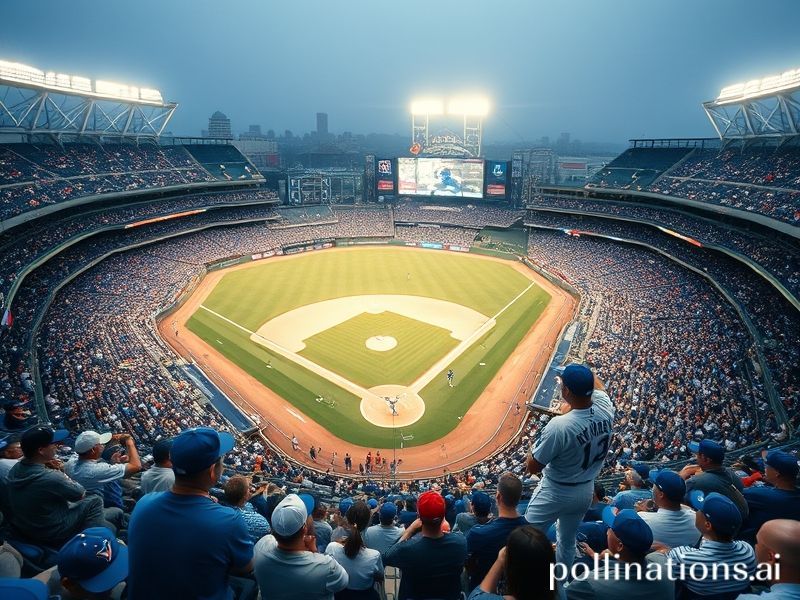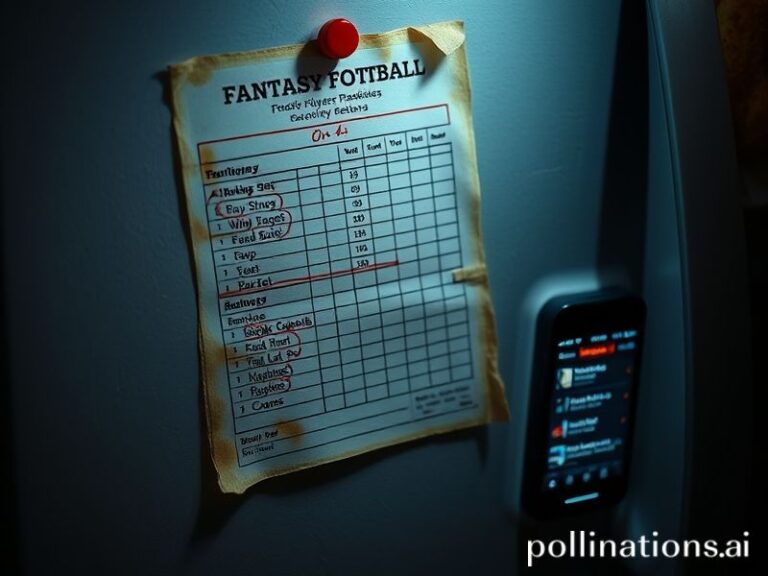How a Blue Jays-Yankees Game Quietly Runs the World Economy (and Other Absurd Truths)
Détente at 95 mph: How a Blue Jay–Yankee Grudge Match Quietly Runs the Planet
By Elias Moreau, International Correspondent, Dave’s Locker
TORONTO—Every August, diplomats in Geneva pretend to argue about carbon credits while the real negotiations unfold 550 kilometers northwest under retractable roofing. In Section 235 of the Rogers Centre, a man in a Che Guevara T-shirt high-fives a Bay Street currency trader over a shared hatred for pinstripes. Meanwhile, on the infield dirt, Vladimir Guerrero Jr. flips his bat with the same wrist action once used to sign NAFTA side-letters. This is not baseball; this is the last functioning multilateral forum.
The Toronto Blue Jays versus the New York Yankees is less a sports rivalry than a low-grade proxy war fought with maple-bacon poutine and $18 craft lagers. One side represents a polite nation that weaponizes manners; the other, an empire that weaponizes everything else. The rest of the world watches because it has learned—often the hard way—that whatever happens in this particular ballpark eventually migrates into monetary policy, microchip tariffs, and those inexplicable shortages of Sriracha.
Consider the global supply-chain angle. When Aaron Judge launches a baseball into the stratosphere, that souvenir is harvested by entrepreneurial children who flip it on an Alibaba subsidiary before it lands. The proceeds finance a dorm-room startup in Bangalore that reverse-engineers the stitching algorithm for smart baseballs that will soon monitor your REM sleep. Somewhere, a WTO delegate sighs and deletes another paragraph on textile quotas.
Or take the soft-power calculus. Canada exports comedians, cobalt, and guilty consciences; the United States exports aircraft carriers, Taylor Swift, and the idea that nine innings equal manifest destiny. Each time the Jays take the Yankees to extra frames, the Canadian Broadcasting Corporation’s ratings spike in Finland—Finland!—where insomniacs gamble on whether Bo Bichette’s hair will trigger a diplomatic incident. (It has; the Finnish ambassador now requests “non-provocative hairstyles” in bilateral communiqués.)
The betting markets in Macau treat this rivalry like a petri dish for late-stage capitalism. Odds fluctuate in real time with the yield on 30-year Treasuries, copper futures, and whatever Elon Musk tweeted while on Ambien. Last season, a single questionable strike-three call moved the Hang Seng half a percent. Analysts blamed “geopolitical headwinds,” code for the fact that the umpire’s cousin had gone long on Lockheed Martin.
Even climate diplomacy has skin in this game. The Yankees’ carbon footprint is roughly the size of Slovenia; the Jays offset theirs by planting trees in Guatemala and hoping nobody checks. When New York’s bullpen carts emit more nitrous oxide than a Baltic ferry, Greta Thunberg tweets a picture of a seagull choking on a rally towel. Within hours, both teams announce “green initiatives” that amount to printing slogans on recycled polyester and calling it a revolution.
And then there is the matter of diaspora loyalties. In Manila, jeepney drivers stream the game on cracked Android screens, praying for a Yankee loss because it will annoy their cousins in Queens. London pubs open at 4 a.m. to accommodate expats who argue about Brexit using OPS+ statistics. In Lagos, a startup streams pirate feeds with live Yoruba commentary that translates “brushback pitch” as “imperialist intimidation tactic.” Colonialism dies hard; it just changes uniforms.
Tonight, as the retractable roof slides shut against the inevitable drizzle, the stadium lights bleach the sky a queasy corporate lavender. A drone hovers overhead—broadcast rights? crowd surveillance? Amazon Prime delivery?—while below, a vendor mutters that hot-dog prices are pegged to the Turkish lira. Somewhere in the upper deck, a diplomat from a midsize republic realizes that the trade deal he’s been negotiating for three years could be settled by a simple wager: loser adopts the metric system.
The first pitch arrives at 97 mph, a blur of white hurtling toward geopolitical consequence. The world inhales. And just like that, we remember why we still tolerate this planet: because every so often, it offers the fleeting grace of a 400-foot home run that makes the Dow Jones, the Doomsday Clock, and your student-loan interest rate all feel beautifully, absurdly irrelevant—for about four and a half seconds.
Play ball. The apocalypse can wait; it’s batting third.







